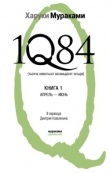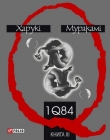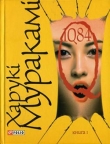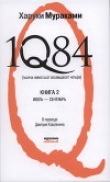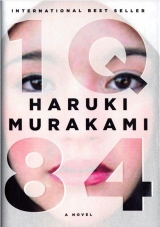
Текст книги "1q84"
Автор книги: Haruki Murakami
Жанр:
Современная проза
сообщить о нарушении
Текущая страница: 78 (всего у книги 81 страниц)
Aomame. But he didn’t say it aloud. He didn’t open his eyes. He just squeezed her hand in return. He remembered this hand. Never once in twenty years had he forgotten the feeling. Of course, it was no longer the tiny hand of a ten-year-old girl. Over the past twenty years her hand had touched many things. It had clasped untold numbers of objects in every possible shape. And the strength within it had grown. Yet Tengo knew right away: this was the very same hand. The way it squeezed his own hand and the feeling it was trying to convey were exactly the same.
Inside him, twenty years dissolved and mixed into one complex, swirling whole. Everything that had accumulated over the years—all he had seen, all the words he had spoken, all the values he had held—all of it coalesced into one solid, thick pillar in his heart, the core of which was spinning like a potter’s wheel. Wordlessly, Tengo observed the scene, as if watching the destruction and rebirth of a planet.
Aomame kept silent as well. The two of them on top of the freezing slide, wordlessly holding hands. Once again they were a ten-year-old boy and girl. A lonely boy, and a lonely girl. A classroom, just after school let out, at the beginning of winter. They had neither the power nor the knowledge to know what they should offer to each other, what they should be seeking. They had never, ever, been truly loved, or truly loved someone else. They had never held anyone, never been held. They had no idea, either, where this action would take them. What they entered then was a doorless room. They couldn’t get out, nor could anyone else come in. The two of them didn’t know it at the time, but this was the only truly complete place in the entire world. Totally isolated, yet the one place not tainted with loneliness.
How much time had passed? Five minutes, perhaps, or was it an hour? Or a whole day? Or maybe time had stood still. What did Tengo understand about time? He knew he could stay like this forever, the two of them silent on top of the slide, holding hands. He had felt that way at age ten, and now, twenty years on, he felt the same.
He knew, too, that it would take time for him to acclimate himself to this new world that had come upon him. His entire way of thinking, his way of seeing things, the way he breathed, the way he moved his body—he would need to adjust and rethink every single element of life. And to do that, he needed to gather together all the time that existed in this world. No—maybe the whole world wouldn’t be enough.
“Tengo,” Aomame whispered, a voice neither low or high—a voice holding out a promise. “Open your eyes.”
Tengo opened his eyes. Time began to flow again in the world.
“There’s the moon,” Aomame said.
CHAPTER 28
Ushikawa
AND A PART OF HIS SOUL
The fluorescent light on the ceiling shone down on Ushikawa’s body. The heat was turned off, and a window was open, so the room was as freezing as an icehouse. Several conference tables had been shoved together in the center of the room, and on top of them, Ushikawa lay faceup. He had on winter long johns, and an old blanket was thrown on top of him. Under the blanket, his stomach was swollen, like an anthill in a field. A small piece of cloth covered his questioning, opened eyes—eyes that no one had been able to close. His lips were slightly parted, lips from which no breath or words would ever slip out again. The crown of his head was flatter, and more enigmatic-looking, than it had been while he was alive. Thick, black, frizzy hair—reminiscent of pubic hair—shabbily surrounded that crown.
Buzzcut had on a navy-blue down jacket, while Ponytail was wearing a brown suede rancher’s coat with a fur-trimmed collar. Both were slightly ill-fitting, as if they had hurriedly grabbed them from a limited supply of clothing that happened to be on hand. They were indoors, but their breath was white in the cold. The three of them were the sole occupants of the room. Buzzcut, Ponytail, and Ushikawa. There were three aluminum-sash windows on one wall, near the ceiling, and one of them was wide open to help keep the temperature down. Other than the tables with the body, there was no other furniture. It was an entirely bland, no-nonsense room. Placed there, even a corpse—even Ushikawa’s—looked like a colorless, utilitarian object.
No one was talking. The room was utterly devoid of sound. Buzzcut had a lot to ponder, and Ponytail never spoke anyway. Buzzcut was lost in thought, pacing back and forth in front of the table that held Ushikawa’s body. Except for the moment when he reached the wall and had to turn around, his pace never slackened. His leather shoes were totally silent as they trod upon the cheap, light yellow-green carpeting. As usual, Ponytail staked out a spot near the door and stood there, motionless, legs slightly apart, back straight, staring off at an invisible point in space. He didn’t seem tired or cold, not at all. The only evidence that he was still among the living was an occasional rapid burst of blinks, and the measured white breath that left his mouth.
Earlier that day, a number of people had gathered in that freezing room to discuss the situation. One of Sakigake’s high-ranking members had been on a trip and it had taken a day to get everyone together. The meeting was secret, and they spoke in hushed tones so no one outside could hear. All this time, Ushikawa’s corpse had lain there on the table, like a sample at an industrial machinery convention. Rigor mortis had set in on the corpse, and it would be another three days before that broke and the body was pliable again. Everyone shot the occasional quick glance at the body as they discussed several practical matters.
While they were discussing things there was no sense—even when the talk turned to the deceased—that they were paying respects to him or feeling regret for his passing. The stiff, stocky corpse simply reminded them of certain lessons, and reconfirmed a few reflections on life. Nothing more. Once time has passed, it can’t be taken back. If death brings about any resolution, it’s one that only applies to the deceased. Those sorts of lessons, those sorts of reflections.
What should they do with Ushikawa’s body? They knew the answer before they began. Ushikawa had died of unnatural causes, and if he were discovered, the police would launch an all-out investigation that would inevitably uncover his connection with Sakigake. They couldn’t risk that. As soon as the rigor mortis was gone, they would secretly transport the corpse to the industrial-sized incinerator on the grounds of their compound and dispose of it. Soon it would become nothing but black smoke and white ash. The smoke would be absorbed into the sky, the ash would be spread on the fields as fertilizer for the vegetables. They had performed the same operation a number of times, under Buzzcut’s supervision. Leader’s body had been too big, so they had “handled” it by using a chain saw to cut it into pieces. There was no need to do so this time, for Ushikawa was nowhere near as big. Buzzcut was grateful for that. He didn’t like any operations that got too gory. Whether it was dealing with the living or the dead, he preferred not to see any blood.
His superior asked Buzzcut some questions. Who could have killed Ushikawa? And what was Ushikawa doing in that rented apartment in Koenji, anyway? As head of security, Buzzcut had to respond, though he really didn’t know the answers.
Before dawn on Tuesday he had gotten the call from that mysterious man (who was, of course, Tamaru) and learned that Ushikawa’s body was in the apartment. Their conversation was at once practical and indirect. As soon as he hung up, Buzzcut immediately put out a call to a couple of followers in Tokyo. They changed into work uniforms, pretending to be movers, and headed out to the apartment in a Toyota HiAce van. Before they went inside, they made sure it wasn’t a trap. They parked the van and one of them scouted out the surroundings for anything suspicious. They needed to be very cautious. The police might be lying in wait, ready to arrest them as soon as they set foot in the place, something they had to avoid at all costs.
They had brought along a container, the kind used in moving, and somehow were able to stuff the already-stiff body inside. Then they shouldered it out of the building and into the bed of the van. It was late at night, and cold, so fortunately there was no one else around. It took some time to comb through the apartment to make sure no telling evidence was left behind. Using flashlights, they searched every square inch, but they found nothing incriminating, just food, a small electric space heater, a sleeping bag, and a few other basic necessities. The garbage can was mainly full of empty cans and plastic bottles. It appeared that Ushikawa had been holed up there doing surveillance. Buzzcut’s sharp eye noted the indentations in the tatami near the window that indicated the presence of a camera tripod, though there was no camera and there were no photographs. The person who had taken Ushikawa’s life must have also taken the camera away, along with the film. Since Ushikawa was dressed only in his underwear, he must have been attacked while asleep. The attacker must have silently slipped inside the apartment. It looked like Ushikawa had suffered horribly, for his underwear was completely saturated with urine.
Buzzcut and Ponytail were the only ones in the van when they transported the body to Yamanashi. The other two stayed behind in Tokyo to handle anything that might come up. Ponytail drove the entire way. The HiAce left the Metropolitan Expressway, got onto the Chuo Highway, and headed west. It was still dark out and the expressway was nearly deserted, but they kept their speed under the limit. If the police stopped them now it would be all over. Their license plates—both front and rear—were stolen, and the container in back contained a dead body. There would be no way to talk their way out of that situation. The two of them were silent for the entire trip.
When they arrived at the compound at dawn, a Sakigake doctor examined Ushikawa’s body and confirmed that he had died of suffocation. There were no signs of strangulation around the neck, however. The doctor guessed that a bag or something that didn’t leave any evidence must have been placed over the victim’s head. There were no marks, either, to indicate that the victim’s hands and feet had been tied. He didn’t appear to have been beaten or tortured. His expression didn’t show any signs of agony. If you had to describe his expression, you would say it was one of pure confusion, as if he had been asking a question he knew wouldn’t be answered. It was obvious that he had been murdered, but the corpse was remarkably untouched, which the doctor found odd. Whoever had killed him may have massaged his features after his death, to give him a calmer, more natural expression.
“Whoever did this was a real professional,” Buzzcut explained to his superior. “There are no marks on him at all. He probably never had a chance to even scream. It happened in the middle of the night, and if he had yelled out in pain, everyone in the building would have heard him. This is the work of a professional hit man.”
But why had Ushikawa ended up murdered by a professional killer?
Buzzcut chose his words carefully. “I think Mr. Ushikawa must have stepped on somebody’s tail, someone he never should have crossed. Before he even realized what he had done.”
Was this the same person who had disposed of Leader?
“I don’t have any proof, but the chances are pretty good,” Buzzcut said. “And I think Mr. Ushikawa must have undergone something close to torture. I don’t know what exactly was done to him, but he definitely was interrogated ruthlessly.”
How much did he say?
“I’m sure he told everything he knew,” Buzzcut said. “I have no doubt about it. But Ushikawa only had limited knowledge of what was going on. So I don’t think that anything he told them will come back to hurt us.”
Buzzcut didn’t have access to everything that was going on within Sakigake, though he knew a lot more than an outsider.
By professional, do you mean this person is connected to organized crime? the superior asked.
“This isn’t the work of the yakuza or organized criminals,” Buzzcut said, shaking his head. “They’re less subtle and more gory. They wouldn’t do something this intricate. Whoever killed Ushikawa was sending us a message. He’s telling us he has a sophisticated system backing him up, and if anybody tries anything, there will be consequences. And that we should keep our noses out of it.”
It?
Buzzcut shook his head. “What exactly he means by that, I don’t know. Ushikawa was working on his own. I asked him any number of times to give me a progress report, but he insisted that he still didn’t have enough material. I think he wanted to gather all the facts together by himself first. Which is why he was the only one who knew what was going on when he was murdered. It was Leader himself who had originally singled out Ushikawa. He worked as a kind of independent agent. He didn’t like organizations. Considering the chain of command, I wasn’t in a position to give him orders.”
Buzzcut wanted to make it absolutely clear how far his responsibility extended. Sakigake was itself an established organization. All organizations have rules, and breaking these rules could lead to punishment. He did not want to be blamed for mishandling this affair.
Who was Ushikawa watching in that apartment building?
“We don’t know yet. Normally you would expect it to be someone who lives in the building, or in the vicinity. The men I left back in Tokyo are investigating as we speak, but they haven’t reported in yet. It will take some time. It might be best if I go back to Tokyo and look into it myself.”
Buzzcut wasn’t all that confident in the abilities of the men he had left behind. They were devoted, but not the sharpest pencils in the box. And he hadn’t explained the situation in much detail to them. It would be much more efficient for him to take charge directly. They should go through Ushikawa’s office as well, though the man on the phone might have already beaten them to it. His superior, however, didn’t permit him to return to Tokyo. Until things got a bit clearer, he and Ponytail were to stay put. That was an order.
Was Aomame the person Ushikawa had been watching?
“No, it couldn’t have been Aomame,” Buzzcut said. “If Aomame had been there, he would have immediately reported it. That would have completed his assignment. I think the person he had under watch was connected to—or might have been connected to—Aomame’s whereabouts. Otherwise it doesn’t add up.”
And while he had that person under surveillance, someone found out about him, and took steps to stop him?
“That would be my guess,” Buzzcut said. “He was getting too close to something dangerous. He may have found some vital clue. If there had been several people on the surveillance work, they could have watched each other’s backs and things might have ended up differently.”
You spoke directly to that man on the phone. Does it look as though we’ll be able to meet Aomame and talk with her?
“I really can’t predict. I would imagine, though, that if Aomame isn’t willing to negotiate with us, the chances are slim that there will be any meeting. That would be my guess. Everything depends on how she wants to play it.”
They should be pleased that we’re willing to overlook what happened to Leader and guarantee her safety.
“They want more information. Such as, why do we want to meet with Aomame? Why are we seeking a truce? What exactly are we hoping to negotiate?”
The fact that they want to learn more means they don’t have any solid information.
“Exactly. But we don’t have any solid information about them, either. We still don’t even know the reason they went to all the time and trouble to concoct a plan to murder Leader.”
Either way, while we wait for their reply, we have to keep on searching for Aomame. Even if it means stepping on somebody’s tail.
Buzzcut paused a moment, and then spoke. “We have a close-knit organization here. We can put a team together and get them out in the field in no time at all. We have a sense of purpose and high morale. People are literally willing to sacrifice themselves, if need be. But from a purely technical perspective, we’re nothing more than a band of amateurs. We haven’t had any specialized training. Compared with us, the other side are consummate professionals. They know what they’re doing, they take action calmly, and they never hesitate. They seem like real veterans. As you’re aware, Mr. Ushikawa was no slouch himself.”
How exactly do you propose to continue the search?
“At present I think it’s best to pursue the valuable lead that Mr. Ushikawa himself unearthed. Whatever it may be.”
Meaning we don’t have any valuable leads of our own?
“Correct,” Buzzcut admitted.
No matter how dangerous it might become, and what sacrifices have to be made, we have to find and secure this woman Aomame. As quickly as possible.
“Is this what the voice has directed us to do?” Buzzcut asked. “That we should secure Aomame as quickly as possible? By whatever means necessary?”
His superior didn’t reply. Information beyond this was above Buzzcut’s pay grade. He was not one of the top brass, merely the head foot soldier. But Buzzcut knew that this was the final message given by them, most likely the final “voice” that the shrine maidens had heard.
As Buzzcut paced in front of Ushikawa’s corpse in the freezing-cold room, a thought suddenly flashed through his head. He came to an abrupt halt, frowning, his brow knit, as he tried to grab hold of it. The moment he stopped pacing, Ponytail moved. A fraction. He let out a deep breath, and shifted his weight from one foot to the other.
Koenji, Buzzcut thought. He frowned slightly, searching the dark depths of memory. Ever so cautiously, he pulled at a thin thread, tugging it toward him. Somebody else involved in this affair lives in Koenji. But who?
He took a thick, crumpled memo pad out of his pocket and flipped through it. Tengo Kawana. His address was in Koenji, Suginami Ward. The same exact address, in fact, as the building in which Ushikawa died. Only the apartment numbers were different—the third floor and the first floor. Had Ushikawa been secretly watching Tengo’s movements? There was no doubt about it. The two of them living in the same building was too big a coincidence.
But why, in this situation, did Ushikawa have to trace Tengo’s movements? Buzzcut hadn’t recalled Tengo’s address up till now because he was no longer concerned about him. Tengo was nothing more than a ghostwriter. There had been nothing else about him that they needed to know. Sakigake’s interest was now entirely focused on locating Aomame. Despite this, Ushikawa had focused all his attention on the cram school instructor, setting up an elaborate stakeout. And losing his own life in the bargain. Why?
Buzzcut couldn’t figure it out. Ushikawa clearly had some sort of lead. He must have thought that sticking close to Tengo would lead him to Aomame—which is why he went to the trouble of securing that apartment, setting up a camera on a tripod, and observing Tengo, probably for some time. But what connection could there be between Tengo and Aomame?
Without a word, Buzzcut left the room, went into the room next door—which was heated—and made a phone call to Tokyo, to a unit in a condo in Sakuragaoka in Shibuya. He ordered one of his subordinates to immediately go back to Ushikawa’s apartment in Koenji and keep watch over Tengo’s movements. Tengo is a large man, with short hair, so you can’t miss him, he instructed him. If he leaves the building, the two of you are to tail him, but make sure he doesn’t spot you. Don’t let him out of your sight. Find out where he’s going. At all costs, you’ve got to keep him under surveillance. We’ll join you as soon as we can.
Buzzcut went back to the room that held Ushikawa’s body and told Ponytail they would be leaving right away for Tokyo. Ponytail gave a slight nod. He didn’t ask for an explanation. He grasped what was asked of him and leapt into action. After they left the room, Buzzcut locked it so that no outsiders would have access. They went out of the building and chose, from a line of ten cars, a black Nissan Gloria. They got in, and Ponytail turned the key, already in the ignition, and started the engine. As per their rules, the car’s gas tank was full. Ponytail would drive, as usual. The license plates for the Gloria sedan were legal, the registration clean, so even if they exceeded the speed limit a bit, it wouldn’t be a problem.
They had been on the highway for a while by the time it occurred to Buzzcut that he hadn’t gotten permission from his superiors to go back to Tokyo. This could come back to haunt him, but it was too late now. There wasn’t a moment to lose. He would have to explain the situation to them after he got to Tokyo. He frowned a bit. Sometimes the restrictions disgusted him. The number of rules increased, but never decreased. Still, he knew he couldn’t survive outside the system. He was no lone wolf. He was one cog among many, following orders from above.
He switched on the radio and listened to the regular eight o’clock news. When the broadcast was done, Buzzcut turned off the radio, adjusted his seat, and took a short nap. When he woke up he felt hungry—How long has it been since I’ve had a decent meal? he wondered—but there was no time to stop at a rest area for a bite to eat. They were in too much of a hurry.
By this time, however, Tengo had been reunited with Aomame on top of the slide in the park. Buzzcut and Ponytail had no idea where Tengo was headed. Above Tengo and Aomame, the two moons hung in the sky.
Ushikawa’s body lay there in the frozen darkness. No one else was in the room. The lights were off, the door locked from the outside. Through the windows near the ceiling, pale moonlight shone in. But the angle made it impossible for Ushikawa to see the moon. So he couldn’t know if there was one moon, or two.
There was no clock in the room, so it was unclear what time it was. Probably an hour or so had passed since Buzzcut and Ponytail had left. If someone else had been there, he would have seen Ushikawa’s mouth suddenly begin to move. He would have been frightened out of his wits. This was a terrifying, wholly unexpected event. Ushikawa had long since expired and his body was stiff as a board. Despite this, his mouth continued to tremble slightly. Then, with a dry sound, it opened wide.
If someone had been there, he would no doubt have expected Ushikawa to say something. Some pearls of wisdom that only the dead could impart. Terrified, the person would have waited with bated breath. What secret could he be about to reveal?
But no voice came out. What came out were not words, not a drawn-out breath, but six tiny people, each about two inches tall. Their little bodies were dressed in tiny clothes, and they trod over the greenish mossy tongue, clambering over the dirty, irregular teeth. One by one they emerged, like miners returning to the surface after a hard day’s labor. But unlike miners their clothes and faces were sparkling clean, not soiled at all. They were free of all dirt and wear.
Six Little People came out of Ushikawa’s mouth and climbed down to the conference table, where each one shook himself and gradually grew bigger. When needed, they could adjust their size, but they never grew taller than a yard or shorter than an inch. When they grew to between twenty-four and twenty-eight inches tall, they stopped shaking and then, in order, descended from the table to the floor. The Little People’s faces had no expression. But they weren’t like masks. They had quite ordinary faces—smaller, but no different from yours or mine. It’s just that, at that moment, they felt no need for any expression.
They seemed neither in a hurry nor too relaxed. They had exactly the right amount of time for the work that they needed to do. That time was neither too long nor too short. Without any obvious signal, the six of them quietly sat down on the floor in a circle. It was a perfect little circle, precisely two yards in diameter.
Wordlessly, one of them reached out and grabbed a single thin thread from the air. The thread was about six inches long, nearly a transparent white, almost creamy color. He placed the thread on the floor. The next person did exactly the same, the same color and thread length. The next three followed suit. Only the last one did something different. He stood up, left the circle, clambered back up on the conference table, reached out, and plucked one frizzy hair from Ushikawa’s misshapen head. The hair came out with a tiny snap. This was his substitute thread. With practiced hands the first of the Little People wove together those five air threads and the single hair from Ushikawa’s head.
And thus the Little People made a new air chrysalis. No one talked now, or chanted out a rhythm. They silently pulled threads from the air, plucked hairs from Ushikawa’s head, and—in a set, smooth rhythm—briskly wove together an air chrysalis. Even in the freezing room their breath wasn’t white. If anyone else had been there to see it, he might have found this odd too. Or perhaps he wouldn’t have even noticed, given all the other surprising things going on.
No matter how intently the Little People worked (and they never stopped), completing an air chrysalis in one night was out of the question. It would take at least three days. But they didn’t appear to be rushing. It would be another two days before Ushikawa’s rigor mortis had passed and his body could be taken to the incinerator. They were well aware of this. If they got most of it done in two nights, that would be fine. They had enough time for what they needed to do. And they never got tired.
Ushikawa lay on the table, bathed in pale moonlight. His mouth was wide open, as were his unclosable eyes, which were covered by thick cloth. In their final moment, those eyes had seen a house, and a tiny dog scampering about a small patch of lawn.
And a part of his soul was about to change into an air chrysalis.


